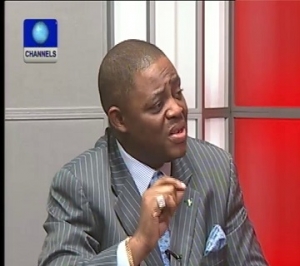
Mr Fani-Kayode, is being prosecuted by the Economic and Financial Crimes Commission (EFCC) and is standing trial on an amended 40 count charge, of laundering about N100m.
In the ‘no case submission’, he argues that the EFCC has not succeeded in linking him to the charges, a situation which warrants him to make no defence.
Channels Television’s judiciary correspondent, Shola Soyele reports that the case against the former aviation minister will be dismissed if the court agrees with him and upholds his no case Submission.
At today’s sitting, the former minister’s Counsel, Mr Ifedayo Adedipe (SAN), informed the court of the application for the no case submission and urged the court to adopt his submissions & discharge his client of all 40 counts of money laundering.
The lawyer argued that even though the statement of account of the accused person was put in evidence for which he was required by the prosecution to make explanations, such statement was not prima facie evidence of crime.
Citing the authority of Abacha vs State, the lawyer stressed that by the decision of the Supreme Court, such statements of account could only amount to mere suspicion, suspicion which no matter how well placed, did not constitute a prima facie case.
The prosecutor, Mr Festus Keyamo, has however opposed the no case submission, and called on the former minister to put his defence forward.
He corrected the notion that the prosecution’s case does not concern lodgement, but transactions which took place before the lodgement.
According to him, “transactions which are done without going through financial institutions, is what comes under the definition of money laundering” and these are the charges against the accused person.
He therefore, urged the court to uphold the objection of the prosecution.
After listening to the submissions of counsels, Justice Rita Ofili-Ajumogobia adjourned the case to November 17 for ruling.
The former minister, Fani-Kayode was first arraigned sometime in December 2008 before Justice Ramat Mohammed on a 47-count charge. He had pleaded not guilty to the charge and Justice Mohammed had granted him bail in the sum of N200 Million with two sureties in like sum.
He was re-arraigned before Justice Binta Murtala-Nyako, following the transfer of Justice Mohammed from the Lagos Division of the court.
The accused was again re-arraigned before Justice Ajumogobia on February 11, 2013 after the transfer of Justice Murtala-Nyako.
He was again re-arraigned before Ajumogobia on March 6, following the amendment of the 47-count charge to 40-counts, the EFCC having dropped seven of the counts.
Ajumogobia is the third judge to be ceased of the case in the last five years.
The EFCC opened its case before Justice Ajumogobia on March 10, calling a total of six witnesses including: Investigating Police Officers (IPOs), bank legal officers, bank relationship officer and a former aide to Fani-Kayode.
All witnesses had given various testimonies, as to their relationship with the accused, as well as the manner of investigations conducted on him.
The EFCC closed its case on July 10, while the defence counsel elected to file a no case submission on behalf of the accused on August 5. In the charge, the accused was alleged to have transacted with funds exceeding N500, 000 without going through a financial institution.
The accused was also alleged to have accepted cash payments in the tune of about N100 million, while he held sway as Minister of Aviation and Minister of Culture and Tourism respectively.
The offence is said to contravene the provisions of Sections 15(1) (a) (b) (c) (d) and 15 (2) (a) (b) of the Money Laundering (prohibition) Act, 2004.

